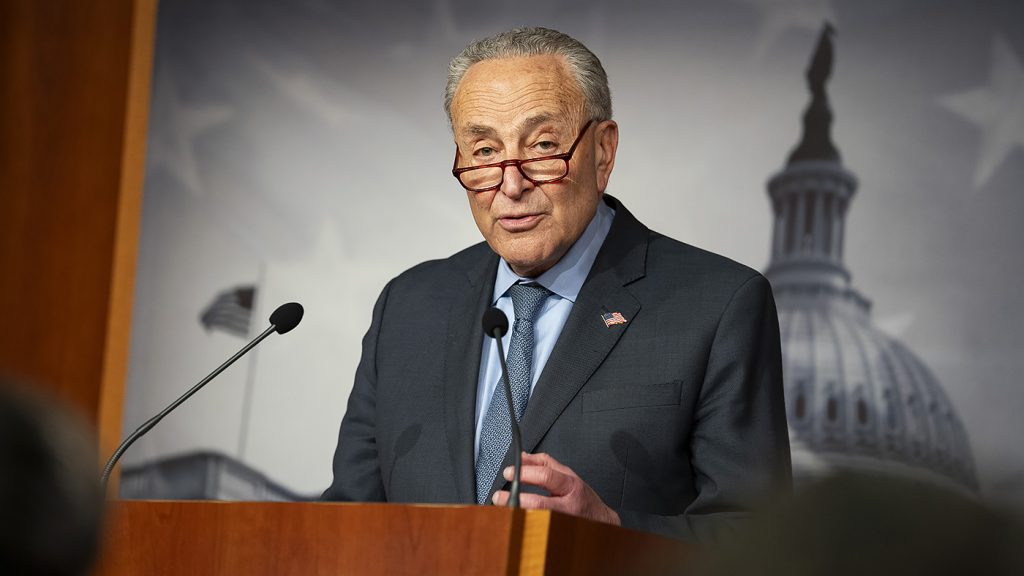A bill to renew the Foreign Intelligence Surveillance Act's (FISA) program that allows spying without warrants faced a delay in the Senate on Friday due to a disagreement over amendments. Senate Majority Leader Chuck Schumer (D-N.Y.) is concerned that the bill might be sent back to the House if the amendments are passed.
Both Republican and Democratic senators and their aides now believe that FISA's Section 702 authority will probably expire at midnight because Schumer is not close to allowing colleagues who want amendments to vote on their proposals.
In response, senators who want changes to the bill are not willing to give up floor time to permit a final vote before the expanded surveillance power under Section 702 expires at midnight.
Sen. John Cornyn (R-Texas) expressed that the warrantless surveillance program is likely to stop because of the stalemate in the Senate.
Sen. Kevin Cramer (R-N.D.) informed reporters on Friday afternoon that Schumer may not have the necessary sixty votes to move the intelligence authorization bill to a final vote unless he agrees to let senators vote on amendments.
He and Senate Democratic Whip Dick Durbin (Ill.) have proposed an amendment that would make it necessary for the government to seek court approval before accessing the content of Americans' private communications collected in the Section 702 surveillance. This amendment has a good chance of passing.
Cramer expressed frustration, stating that they are clearly afraid the amendment will pass, and that they are preventing votes on anything that might alter their plan. He highlighted the lack of democracy in the decision-making process and the influence of a small number of individuals.
Cramer also pointed out the lack of true negotiation about setting up votes on amendments and criticized the approach of ensuring an amendment won't pass before allowing a vote. He questioned the purpose of having a body of 100 senators if decisions are made by a small group.
Durbin mentioned the limited progress in negotiating votes on amendments and expressed hope for a soon amendment deal.
Durbin stated that there has been little progress in this area and expressed hope for an amendment deal soon.
Durbin revealed that he has not yet been approached about a potential vote on his amendment, which is similar to an amendment proposed by Rep. Andy Biggs (R-Ariz.) in the House, which narrowly failed earlier in the week.
Durbin emphasized that his and Cramer's amendment has a better chance of passing because it is more specific than the Biggs proposal.
He believes that their amendment is more specific than the Biggs amendment and has a better chance of being approved.
The Durbin-Cramer proposal would require an amendment to access the content of Americans' communications collected in the 702 program, while the Biggs amendment would have required a warrant to review Americans' data more generally.
The other changes that have a good possibility of being approved are ideas supported by Sens. Ron Wyden (R-Ore.) and Mike Lee (R-Utah).
Wyden’s change would remove language added to the bill by House Intelligence Committee Chairman Mike Turner (R-Ohio) that would increase the range of businesses required to follow government surveillance and data requests.
Wyden cautioned on the floor that the provision is phrased so broadly that “there would be almost no limits to who can be compelled into spying for the government.”
“Any company that installs, maintains, or fixes wifi or other communications systems in any American business, home or church can be pulled into this,” Wyden argued on the Senate floor.
The third change in question, supported by Lee, would expand the role that amici curiae or friends of the court would have in Foreign Intelligence Surveillance Court proceedings, giving outside groups an opportunity to disagree with or provide feedback on government surveillance requests.
The Senate passed Lee’s change to strengthen third-party oversight of the FISA process by a vote of 77-19 in 2020 but the proposal stalled in the House and failed to become law.
Cornyn cautioned on Friday that if adopted, Lee’s change would create a “significant legal obstacle in the 702 process.”
Sen. Lindsey Graham (R-S.C.) coming out of a GOP lunch meeting Friday afternoon said Schumer is in a difficult position because if the bill is changed, it would have to go back to the House before reaching President Biden’s desk, which means Congress would exceed the deadline for reauthorizing the program.
“If any of them pass, it throws the bill in a ditch,” he warned of the amendments.
But he also pointed out that if the senators demanding votes on amendments refuse to yield back time, the FISA bill won’t pass the Senate until Monday or Tuesday.
Cramer cautioned that Schumer might not even get the 60 votes he needs to advance the reauthorization bill to a final vote without offering colleagues a chance to vote on amendments.









